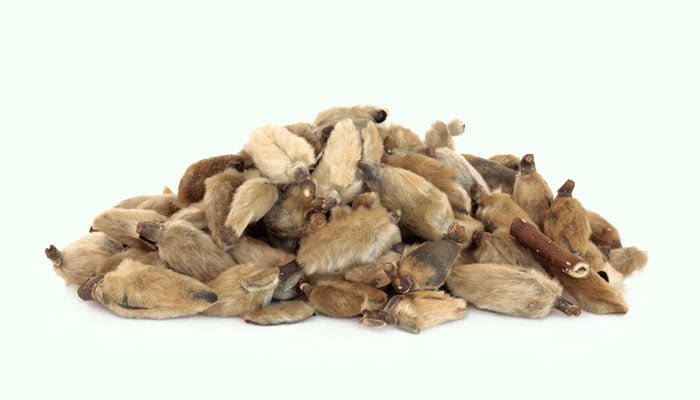What Is Xin Yi Hua
Xin Yi Hua commonly known as Flos Magnoliae is the flower bud of Magnolia biondii, M. denudata, or M. sprengeri, which is a perennial deciduous tree belonging to the family Magnoliaceae. It is a relatively practical and common Chinese herbal medicine, which first appeared in <Shennong Ben Cao Jing> in the late Western Han Dynasty (about 100 BC).
There are about 340 species of Magnolia, which are mainly distributed in East Asia, Southeast Asia, Eastern North America, Central America, and the West Indies. Only a few species are distributed in South America. They have high economic value and are widely used in many fields such as gardens, architecture, and food. Among them, some plants are used medicinally, such as Magnolia biondii, M. denudata, and M. sprengeri.
Magnolia biondii is a common garden plant. They often grow in forested areas at an altitude of 600-1,200 meters. They are distributed in Henan, Hubei, Sichuan, Qingdao, Shaanxi, Shandong, and Gansu in China. Their origin is Nanzhao County, Henan Province, which is the hometown of Chinese magnolia.
M. denudata is commonly known as Yulania denudata or Lily Tree. This plant often grows in forests at an altitude of 500-1,000 meters. It is native to central and eastern China and has now been introduced into Japan, the United States, and some European countries.
M. sprengeri is light-loving, hardy, and can spend the winter in the open air. They often grow in forests or shrubs at an altitude of 1,300-2,400 meters. They are distributed in Shaanxi, Hubei, Gansu, Hunan, Henan, and Sichuan.

At the end of winter and early spring each year, people gather the unopened flower buds of Magnolia biondii, M. denudata, or M. sprengeri, remove their branches, dry them in the shade, and make them into Chinese herbal medicines.
Xin Yi Hua contains a lot of volatile oil, and its components include α-pinene, β-pinene, sabinene, myrcene, 1,8-cineole, citrene, camphor, terpinene-4-ol, α-terpinol, trans-carypohyllene, β-ylangene, δ-cadinene, and α-cubebol. In addition, it also contains veraguensin, denudatone, magnolin, fargesin, denudatin B, licarin B, vanillic acid, syringin, methyl vanillate, caffeic acid, magnoflorine, rutin, and quercetin-7-glucoside.
According to the Chinese Pharmacopoeia, the medicinal nature of Xin Yi Hua is relatively warm, with a pungent taste. It has a certain therapeutic effect on pathological changes of the lung and stomach meridians.
In traditional Chinese medicine, it is often used to disperse wind and cold, relieve stuffy nose, and treat headache due to wind-cold, treat runny nose, sinusitis, acute rhinitis, chronic rhinitis, allergic rhinitis, atrophic rhinitis, chronic bronchitis, and thunder headache.
There are about 100 kinds of Chinese medicine prescriptions containing it, such as Xinyi Biyan Wan, Biyuan Wan, and Xinfang Biyan capsules.
Benefits
- Anti-inflammation, inhibiting mouse ear swelling caused by xylene and rat foot swelling caused by carrageenan.
- Anti-oxidation, enhancing the activity of superoxide dismutase and reducing the content of malondialdehyde.
- Reducing alcohol-induced liver damage and protecting the liver.
- Extending the incubation period of guinea pig asthma caused by egg white, reducing the lung overflow of sensitized guinea pigs and the level of IL-5 and IL-8 in the serum of sensitized guinea pigs, and relaxing the bronchial smooth muscle of sensitized guinea pigs.
- Dispersing wind and cold, treating headache and nasal congestion caused by wind-cold.
- Relieving stuffy nose, treating rhinitis, headache, nasal congestion, and runny nose caused by wind-cold or wind-heat.
- Treating nose boils caused by the accumulation of stagnated heat on the lung and stomach.
- Its dichloromethane extract has an inhibitory effect on the contraction of the isolated ileum of guinea pigs caused by histamine and ethyl phenol choline.
- Its volatile oil has a certain inhibitory effect on Staphylococcus aureus, Listeria monocytogenes, Escherichia coli, and Salmonella typhimurium.
- Studies have found that it can activate p38 in nasopharyngeal carcinoma cells (CNE2), thereby enhancing the cytotoxic effect of cisplatin on CNE2.
Combinations
- It can be used in combination with Fang Feng (Radix Saposhnikoviae), Bai Zhi (Radix Angelicae Dahuricae), Xi Xin (Asari Radix et Rhizoma), etc. to treat fever, aversion to cold, headache, and nasal congestion caused by wind-cold.
- It can be used in combination with Bo He (Mentha), Jin Yin Hua (Flos Lonicerae), Ju Hua (Flos Chrysanthemi), etc. to treat nasal congestion and headache caused by wind-heat.
- It can be used in combination with Bai Zhi (Radix Angelicae Dahuricae), Xi Xin (Asari Radix et Rhizoma), Cang Er Zi (Fructus Xanthii), etc. to treat rhinitis, headache, nasal congestion, and runny nose caused by wind-cold.
- It can be used in combination with Bo He (Mentha), Lian Qiao (Fructus Forsythiae), Huang Qin (Radix Scutellariae), etc. to treat rhinitis, headache, nasal congestion, and runny nose caused by wind-heat.
- It can be used in combination with Huang Lian (Rhizoma Coptidis), Lian Qiao (Fructus Forsythiae), Ye Ju Hua (Wild Chrysanthemum Flower), etc. to treat nose boils caused by the accumulation of stagnated heat on the lung and stomach.
Side Effects
- At present, there are no reports in the literature that Xin Yi Hua has toxic effects, and there are no reports of serious adverse reactions when it is taken according to the prescribed dose.
Precautions and Warnings
- The dosage of Xin Yi Hua should be controlled at 3-10g.
- It can be made into decoctions, pills, powders, or ground for external use.
- When cooking them, you should wrap them with gauze. Avoid hair loss on the surface, and irritating your throat.
- People who are allergic to Xin Yi Hua should not take it.
- It should not be used with penicillin or tetracycline at the same time.
- Patients with hyperactivity of fire due to yin deficiency should not take it.
- Pregnant women and breastfeeding women should take it under the guidance of a doctor.
